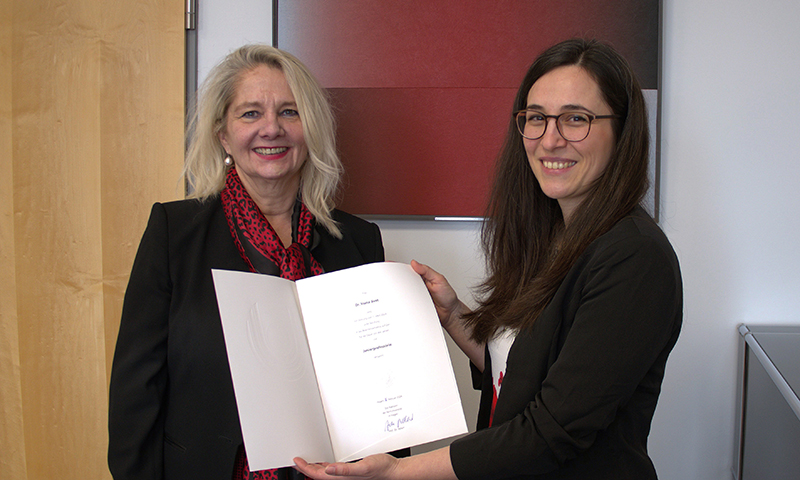News
Learning analytics: "Students need to see the benefits"
[01.03.2024]Creating added value for individual students from learning data of many - that is the goal of Ioana Jivet. She is the new research professor at CATALPA since March 1st. In the Faculty of Mathematics and Computer Science at the FernUniversität in Hagen, she will supervise final theses and offer courses on educational technologies.
 Photo: CATALPA
Photo: CATALPA
At first glance, many people associate learning analytics with graphs and figures that provide information about learning behavior and progress, for example, in an online seminar. Assistant Professor Ioana Jivet likes to present this knowledge on dashboards, which we can also encounter in everyday life, such as speed displays in cars or tracking apps in sport. What is special about her work is her focus on the students' perspective. "Learning analytics are a cycle. We collect data and information from the students about their performance, progress or learning behavior and offer feedback accordingly, either in text form and with the help of graphs. Students need to understand this information, reflect on it and, ideally, adapt their learning behavior accordingly," says Ioana Jivet. "We can only achieve improvement like better learning outcomes, if each link of this chain works well," explains the 35-year-old, who has conducted research at the DIPF (Leibniz Institute for Research and Information in Education) in Frankfurt, among other places. Essentially, the aim of her research is to develop feedback for students that can be generated automatically in order to offer students individual support and at the same time to make teachers' work easier.
We need to involve the students
"If we want to design dashboards in such a way that students actually see an added value for themselves, we have to involve them in the design process." In a study, she found that transparency is an important element for the acceptance of dashboards. Students want to understand the origin of the and, above all, how a certain piece of information will help them in their studies. They also want recommendations on topics and learning activities as well as how to improve their own learning behavior.
SoLAR
The Society for Learning Analytics Research (SoLAR) is an interdisciplinary network of leading international researchers investigating the role and impact of analytics on teaching, learning, training and education. SoLAR also organizes the International Conference on Learning Analytics & Knowledge (LAK). LAK was the first conference of its kind on the topic of learning analytics in 2011.
Reaching the weaker ones better
However: "The students who could benefit most from the feedback in the dashboard hardly use the opportunities. This is my core research question: how can we change this so that those groups, in particular, benefit more?" explains the researcher during the appointment meeting with Rector Ada Pellert.
She finds an ideal setting at the FernUniversität in Hagen and the CATALPA Research Center. The researcher with Romanian roots already knows a number of educational scientists and computer scientists in this field from ongoing CATALPA projects. Jivet is very well connected. She is a member of EATEL, the European Association of Technology-Enhanced Learning and she is the General Chair of the upcoming EC-TEL conference in Krems/Austria in September. Ioana Jivet is a member of the Executive Committee of the international Society for Learning Analytics Research (SoLAR), being involved in the association's strategic decisions. As part of SoLAR, she also hosts the webinar series.
Computer science meets coaching
Ioana Jivet was already a committed student at Delft University of Technology. As a computer scientist, she led the student organization "Board of European Students of Technology" (BEST) as part of the international board for a year alongside her Master's degree. On the board, she dealt with the topic of coaching and further education. In addition to analytics, this is a field that has kept her busy throughout her career. Alongside her doctorate and post-doc, she co-founded a start-up that develops training and coaching tools in her adopted home of Cologne. And most recently, Ioana Jivet had one foot in science and the other in organization. In addition to her duties as science coordinator for "studiumdigitale" at Goethe University in Frankfurt, she also conducted research at the DIPF. Jivet is deals not only with data and analyses, but also always keeps in mind the user perspective, the motivation for learning and the psychological side. "That's why I really appreciate the interdisciplinary approach at CATALPA," she says.
Coincidentally to the research field
Incidentally, Ioana Jivet came to the research field of Learning Analytics by chance. After completing her involvement with the student organization in the Netherlands, she wanted to write her Master's thesis in a particular research group that she had already been in contact with. Learning analytics was brand new at the chair there and was recommended to her. She remembers: "I realized that this was exactly the right thing for me because I could build on my computer science skills and at the same time use a lot of my knowledge about coaching and soft skills training." According to the new professor at FernUni, learning analytics has a strong computer science and human-computer interaction component because algorithms for data analysis as well as platforms and tools for teachers and learners have to be developed. "It must also have a strong pedagogical component because we need to understand the context of use and the learning process," explains Jivet.
With such a 360° view, the scientist likes to relax by immersing herself in fantasy novels and slowing down by knitting or hiking. "Perhaps because I read so much specialist literature in my professional life and my work revolves around data and facts, I sometimes need completely unrealistic stories in my everyday life to switch off in my head," says Jivet with a wink.

